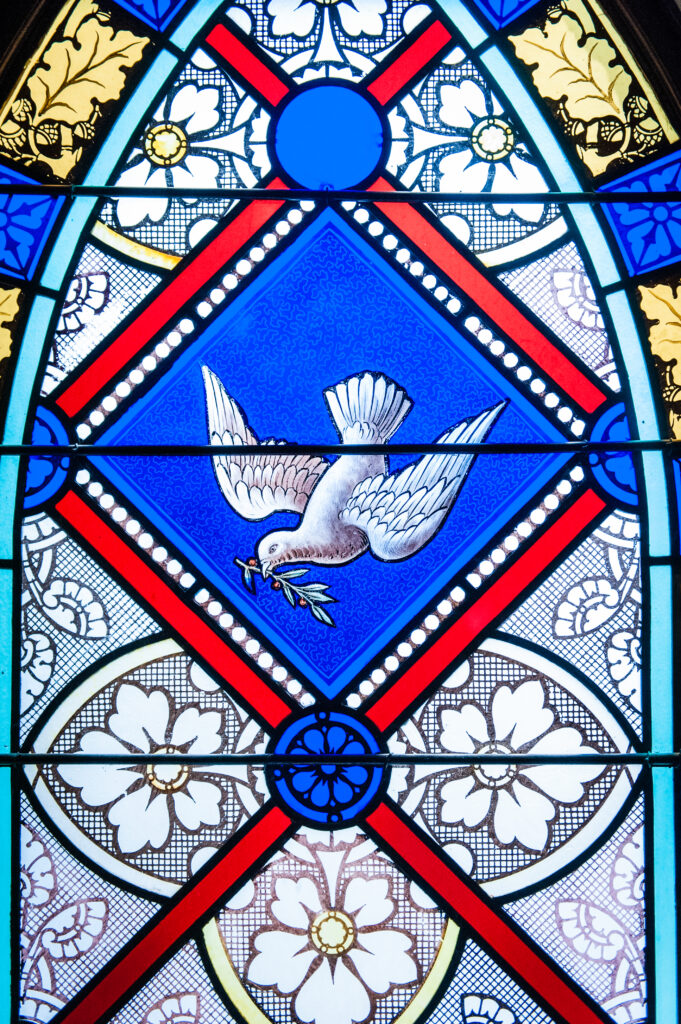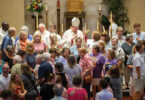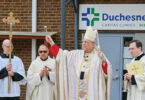
by Therese Horvat
Special to The Leaven
Think of the Holy Spirit as a deep breath of fresh air. As a flame that ignites. As a wind that weaves gently yet powerfully through salvation history. As an abiding presence of faith, hope and love. As forward movement. As an energizing force. As grace and gift.
In spite of — or perhaps because — of these images and symbols, the Holy Spirit, whose importance and impact we celebrate on Pentecost, may be the most challenging Person of the Holy Trinity for us to grasp and understand. The word “Spirit” conjures up something ethereal or fleeting.
However, Scripture and Catholic theology richly profess the Holy Spirit as integral to our belief in the triune God. We learn that Father, Son and Spirit have been in loving relationship with one another for eternity, have interacted throughout history on behalf of our salvation and remain with us forever.
Source of inspiration
Long before the experience of Pentecost, the Spirit’s presence was felt. The Catechism of the Catholic Church teaches that “the Holy Spirit is at work with the Father and the Son from the beginning to the completion of the plan for our salvation.” In the story of creation, the Spirit Breath of God is at the origin of the being and life of every creature.

The Spirit’s influence pervades the covenant promise to Abraham, God’s appearances recorded in the Old Testament and the words of the prophets that lead to the expectation of a messiah upon whom the Spirit will rest and endow with spiritual gifts. “The U.S. Catholic Catechism for Adults” concludes that in the Old Testament, the Spirit is hidden but at work and is experienced and understood as a source of inspiration, life and movement within God’s people.
Redemptive mission shared
The Spirit is more fully revealed in the New Testament. In his 1986 encyclical “On the Holy Spirit in the Life of the Church and World,” St. John Paul II observes that the action of the Spirit was “fully confirmed by the sending of the Son of Man (Jesus) as the messiah, who came in the power of the Holy Spirit.”
The catechism instructs that with the annunciation and in and through Mary, God the Father has found a place where the Son and the Spirit can dwell among humankind. St. John Paul calls the conception and birth of Jesus the greatest work accomplished by the Holy Spirit in the history of creation and salvation. He writes: “Creation is thus completed by the Incarnation and since that moment is permeated by the powers of the Redemption, powers which fill humanity and all creation.”
Jesus’ entire life and ministry are redemptive and Spirit-filled. In Matthew’s Gospel, John the Baptist proclaims, “I am baptizing you with water, for repentance, but the one coming after me . . . will baptize you with the holy Spirit and fire” (3:11). At his own baptism, Jesus experiences the Spirit of God descending upon him and a voice from the heavens affirming, “This is my beloved Son, with whom I am well pleased” (Mt 3:16-17).

The Spirit accompanies Jesus into the desert and braces him against the temptations of the devil as he prepares for his public ministry. The power of the Spirit undergirds the healing and teaching of Jesus. Son and Spirit share in the mission of our salvation.
As Jesus prepares the apostles for his death and departure from earthly existence, he reveals that the “Spirit of truth” will come and guide them and be with them — and us — forever (Jn 16:13). Crucified, risen and glorified, the Son returns to the Father. St. John Paul writes: “The Holy Spirit comes after him (Christ) and because of him, in order to continue in the world, through the church, the work of the Good News of salvation.” The Father sends the Spirit in Jesus’ name.
Pentecost event pivotal
With the descent of the Holy Spirit upon the apostles and Mary, the mystery of the Holy Trinity, three unique Persons in one God, is fully revealed. This event that we commemorate as Pentecost is pivotal in the history of our faith.
The church is born as the apostles and other disciples are fortified by the Spirit to leave the upper room and go forth to spread the good news of Jesus’ life, death and resurrection. God gifts us with the sacrament of reconciliation to grant forgiveness of our sins. We inherit the opportunity to love as God has loved us, to be on fire with the gifts of the Holy Spirit and to bear fruit through our words and actions. God’s salvific work continues in and through the Spirit, the church and us.
Spirit remains vibrant
Sealed with the chrism of baptism and confirmation, we have received the grace of the Spirit. Everything we know in faith is revealed to us by and through the Spirit. As a dynamic, unseen undercurrent, the Spirit prepares us to bring Christ to others; opens our minds and hearts to understand Christ’s death and resurrection; makes present for us the mystery of Christ, especially in the Eucharist; and brings us to communion with God that we may bear much fruit.
The Spirit continues to guide the Catholic Church — in good times and through challenges — to the fullness of truth. The Spirit furnishes and directs the church and us with various gifts. St. Paul writes: “To each individual manifestation of the Spirit is given for some benefit” (1 Cor 12:7).
May we pray daily to the Spirit for guidance and inspiration, for wisdom to use the gifts we’ve received and for the courage of our convictions as Catholic Christians.






